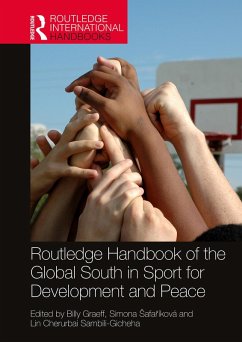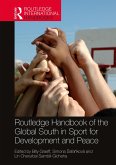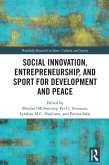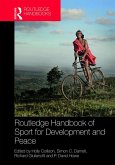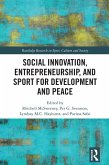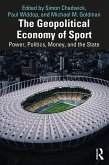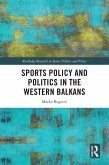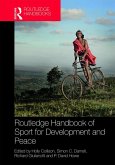Routledge Handbook of the Global South in Sport for Development and Peace (eBook, ePUB)
Redaktion: Graeff, Billy; Cherurbai Sambili-Gicheha, Lin; Safaríková, Simona
48,95 €
48,95 €
inkl. MwSt.
Sofort per Download lieferbar

24 °P sammeln
48,95 €
Als Download kaufen

48,95 €
inkl. MwSt.
Sofort per Download lieferbar

24 °P sammeln
Jetzt verschenken
Alle Infos zum eBook verschenken
48,95 €
inkl. MwSt.
Sofort per Download lieferbar
Alle Infos zum eBook verschenken

24 °P sammeln
Routledge Handbook of the Global South in Sport for Development and Peace (eBook, ePUB)
Redaktion: Graeff, Billy; Cherurbai Sambili-Gicheha, Lin; Safaríková, Simona
- Format: ePub
- Merkliste
- Auf die Merkliste
- Bewerten Bewerten
- Teilen
- Produkt teilen
- Produkterinnerung
- Produkterinnerung

Bitte loggen Sie sich zunächst in Ihr Kundenkonto ein oder registrieren Sie sich bei
bücher.de, um das eBook-Abo tolino select nutzen zu können.
Hier können Sie sich einloggen
Hier können Sie sich einloggen
Sie sind bereits eingeloggt. Klicken Sie auf 2. tolino select Abo, um fortzufahren.

Bitte loggen Sie sich zunächst in Ihr Kundenkonto ein oder registrieren Sie sich bei bücher.de, um das eBook-Abo tolino select nutzen zu können.
This book explores the field of Sport for Development and Peace (SDP), putting Global South voices and perspectives at the centre of the analysis. It covers a wide range of thematic and methodological areas that inform existing and emerging discourses in SDP.
- Geräte: eReader
- mit Kopierschutz
- eBook Hilfe
Andere Kunden interessierten sich auch für
![Routledge Handbook of the Global South in Sport for Development and Peace (eBook, PDF) Routledge Handbook of the Global South in Sport for Development and Peace (eBook, PDF)]() Routledge Handbook of the Global South in Sport for Development and Peace (eBook, PDF)48,95 €
Routledge Handbook of the Global South in Sport for Development and Peace (eBook, PDF)48,95 €![Social Innovation, Entrepreneurship, and Sport for Development and Peace (eBook, ePUB) Social Innovation, Entrepreneurship, and Sport for Development and Peace (eBook, ePUB)]() Social Innovation, Entrepreneurship, and Sport for Development and Peace (eBook, ePUB)40,95 €
Social Innovation, Entrepreneurship, and Sport for Development and Peace (eBook, ePUB)40,95 €![Routledge Handbook of Sport for Development and Peace (eBook, ePUB) Routledge Handbook of Sport for Development and Peace (eBook, ePUB)]() Routledge Handbook of Sport for Development and Peace (eBook, ePUB)46,95 €
Routledge Handbook of Sport for Development and Peace (eBook, ePUB)46,95 €![Social Innovation, Entrepreneurship, and Sport for Development and Peace (eBook, PDF) Social Innovation, Entrepreneurship, and Sport for Development and Peace (eBook, PDF)]() Social Innovation, Entrepreneurship, and Sport for Development and Peace (eBook, PDF)40,95 €
Social Innovation, Entrepreneurship, and Sport for Development and Peace (eBook, PDF)40,95 €![The Geopolitical Economy of Sport (eBook, ePUB) The Geopolitical Economy of Sport (eBook, ePUB)]() The Geopolitical Economy of Sport (eBook, ePUB)40,95 €
The Geopolitical Economy of Sport (eBook, ePUB)40,95 €![Sports Policy and Politics in the Western Balkans (eBook, ePUB) Sports Policy and Politics in the Western Balkans (eBook, ePUB)]() Marko BegovicSports Policy and Politics in the Western Balkans (eBook, ePUB)43,95 €
Marko BegovicSports Policy and Politics in the Western Balkans (eBook, ePUB)43,95 €![Routledge Handbook of Sport for Development and Peace (eBook, PDF) Routledge Handbook of Sport for Development and Peace (eBook, PDF)]() Routledge Handbook of Sport for Development and Peace (eBook, PDF)46,95 €
Routledge Handbook of Sport for Development and Peace (eBook, PDF)46,95 €-
-
-
This book explores the field of Sport for Development and Peace (SDP), putting Global South voices and perspectives at the centre of the analysis. It covers a wide range of thematic and methodological areas that inform existing and emerging discourses in SDP.
Hinweis: Dieser Artikel kann nur an eine deutsche Lieferadresse ausgeliefert werden.
Dieser Download kann aus rechtlichen Gründen nur mit Rechnungsadresse in A, B, BG, CY, CZ, D, DK, EW, E, FIN, F, GR, HR, H, IRL, I, LT, L, LR, M, NL, PL, P, R, S, SLO, SK ausgeliefert werden.
Hinweis: Dieser Artikel kann nur an eine deutsche Lieferadresse ausgeliefert werden.
Produktdetails
- Produktdetails
- Verlag: Taylor & Francis eBooks
- Seitenzahl: 760
- Erscheinungstermin: 18. Juli 2024
- Englisch
- ISBN-13: 9781040023983
- Artikelnr.: 70718260
- Verlag: Taylor & Francis eBooks
- Seitenzahl: 760
- Erscheinungstermin: 18. Juli 2024
- Englisch
- ISBN-13: 9781040023983
- Artikelnr.: 70718260
- Herstellerkennzeichnung Die Herstellerinformationen sind derzeit nicht verfügbar.
Billy Graeff is an Associate Professor at the Federal University of Rio Grande in Brazil, teaching on the sociology of sports and Olympic studies. He is also a Research Fellow within the Centre for Sport Leadership at Stellenbosch University, South Africa, and part of the International Sociology of Sport Association (ISSA - Executive Board), the International Olympic Academy Participants Association (IOAPA), the Latin American Association of Sociocultural Studies of Sport (ALESDE) and the Brazilian College of Sports Sciences (CBCE). Simona afäíková is a Lecturer at the Palacky University Olomouc in the Czech Republic, teaching courses focused on development opportunities in the Asian region, qualitative research, and sport and development. Simona is also an Advisory Board member of ISSA (International Sociology of Sport Association), and a Research Fellow within the Centre for Sport Leadership at Stellenbosch University, South Africa. Simona's research focuses on the role of sport in contributing to social change and in achieving non-sporting goals, with research experience from Latin America (mainly Colombia), Africa (South Africa and Uganda) and the Middle East (Saudi Arabia). Lin Cherurbai Sambili-Gicheha is a Programme Manager within the Commonwealth Secretariat, Sport for Development and Peace (SDP) helping the 56 member countries to enhance the positive contribution that sport can make to sustainable development, health and building peaceful and just societies - including their alignment to the 2030 Agenda for Sustainable Development and SDGs. Lin is committed to connecting policy to practice and providing opportunities for these two interconnected worlds to speak to each other in order to advance sport for sustainable development.
Introduction: Global South Voices on Sport for Development and Peace, Part I: Africa, 1. Conducting an Investigation on a "Sport for Development" Programme in Senegal: Cultural Distances, Epistemological Limits and Methodological Adjustments, 2. The Intersections Between Sport, Development, and Social Entrepreneurship in the Global South: The Case of Botswana, 3. Sport-In-Development Assessment Tool (S-Diat) as Indigenous Response to Meaningful Knowledge Production in Africa, 4. Sport as a Vehicle for Deploying Peace Building and Conflict Resolution in Zimbabwe, 5. Navigating Socio-Cultural Conditions and Gaining Empowerment Through Boxing: The Case of Ugandan Women, 6. Sports Events: The Opportunity for Sports for Development Initiatives in Africa, 7. Environmental Implications of Climate Change for Sport Federations from the South: The Case Study of a Recent Drought in the Western Cape, South Africa, 8. A Multi-Stakeholder Approach to Sport as a Tool for Development in Africa: Comparing Ghana and Zambia, 9. Gender Related Prescripts and Sport: A Case Study from Southern Africa, 10. Conceptualising Social Contributions Through Football: Analysis of Women Football Managers in West Africa, Part II: Asia, 11. Enhancing Peace and Security in Military-Civilian Interactions through Sport: A Case Study of the Philippine Marine Corps' Football for Peace Program (PMC-FFP) in Sulu, Southern Philippines, 12. A Narrative Analysis of Women and Sport in India, 13. Sport for Development and the Post/Anti-Colonial Global South State: Insights from Vietnam, 14. Sport for Development in the Arabian Gulf: Navigating the Global North-South Divide and Listening to the 'Other', 15. Analysing the Role of Sport for Development and Peace Programmes in High-Risk Communities: Violent Extremism Among the Youth of Pakistan, 16. Sport and Migration in Turkey, 17. Potential and Opportunities of Sport for Development and Peace in Pakistan, Iran, Palestine and the Occupied Territories: Mapping Initiatives, Uses and Lessons Learned, 18. Sport Against Development and Peace: Examining the Physical Education Curriculum Under ISIS, 19. Harnessing Sport for the Holistic Development of Children in India, 20. Cultivating Korean Youth Volunteers as Global Citizens with Regional Expertise through Sport for International Development, 21. Japan-ASEAN Sports Cooperation for a Gender Equal Society from the Government Perspectives: A Case Study in Thailand, 22. Women's Empowerment Through Sports in South Asia: Gender and Sport for Development and Peace (SDP) Programs in India and Bangladesh, Part III: South America, 23. Reproduction of Social Inequalities and its Relation to Sport For Development and Peace Programs: Athletes' Migration in Brazil, 24. An Inclusive Football for Development Tournament Impacting Disadvantaged and Indigenous Youths from the Ecuadorian Amazonia: Goals for Life and Dreams, 25. Sport for Development and the Exercise of Care in Sports Social Projects: Voices from the South of Brazil, 26. A Sport-Based Livelihoods Program Addressing the Human Mobility Crisis in Latin America: Lessons from a Global South Sport Non-Governmental Development Organizations (SNGDO) Based in Ecuador, 27. Description of Colombian Youth Experiences Throughout a Sport for Development and Peace Program: Walking from a Local Bogotá Community to the Olympic Games, 28. Factors Associated with the Practice of Sports by Migrants in Mexico, 29. Black Feminisms in Sport: Implications for Anti-Racist School Physical Education in Brazil, 30. Potential of Scuba Diving in Chilean Sports Development Programs, 31. Women's Football in Brazil: What Was Reported Online During the Covid-19 Pandemic?, 32. Young Leaders (YL) from the International Inspiration (IN) Programme in Brazil, 33. Sport as a Possibility to Encourage Bodily Practices and Physical Activities in Primary Health Care, 34. Teaching Possibilities for Physical Education Teachers: Sport and Human Formation, 35. Sport Policies and "Well Living" in Bolivia (2006-2019), 36. Host Residents' Perceptions of the Olympic Legacies: The Legacy Effect on Community Sport Participation, 37. Sport for Development in South America: A Comparison Between Argentina, Chile and Uruguay, 38. The Resocialization of Youth Offenders Through Sports: Challenges and Possibilities, 39. Sustainable Development Goals in Sport for Development and Peace Agenda in Colombia: Analysis of Online Documents, 40. Researchers' Positionalities in Sport for Development: 'Global North', 'Global South', but What is In-Between?, 41. Sports and Maternity in the Work Context: Struggles and Confrontations for Decent Work, 42. Sport and Social Inclusion in Uruguay: Inclusive Potentialities Identification in the Sportive Social Project of Malvin Norte's Neighbourhood, 43. Remembering Sport Education in Brazilian Communities: Climbing a Favela Hill to Build the Pedagogy of Courage, Part IV: North America, 44. Forced Migrant Women in the United States: Experiences and Perspectives Grounded in Sport and Physical Exercise, Part V: Oceania, 45. Suggested Strategies for Encouraging Sports and Social Cohesion in Solomon Islands, Part VI: Global Relations, 46. Downplaying Competition as a Sport-for-Development Strategy: Perceptions from the Global South - Latin American Participants at the 2018 Football-3 Moscow Festival, 47. Preparation, Validation, and Application of a Questionnaire to Assess the Needs Determined by the Sporting Environment in Mixed Ability Rugby, 48. South-North Research Collaboration to Support Local NGO Work in Madagascar on a Sport for Development Project, 49. Performative Conformity in the Monitoring and Evaluation (M&E) of Sport for Development and Peace: 'Seeing Behind the Curtain'
Introduction: Global South Voices on Sport for Development and Peace, Part I: Africa, 1. Conducting an Investigation on a "Sport for Development" Programme in Senegal: Cultural Distances, Epistemological Limits and Methodological Adjustments, 2. The Intersections Between Sport, Development, and Social Entrepreneurship in the Global South: The Case of Botswana, 3. Sport-In-Development Assessment Tool (S-Diat) as Indigenous Response to Meaningful Knowledge Production in Africa, 4. Sport as a Vehicle for Deploying Peace Building and Conflict Resolution in Zimbabwe, 5. Navigating Socio-Cultural Conditions and Gaining Empowerment Through Boxing: The Case of Ugandan Women, 6. Sports Events: The Opportunity for Sports for Development Initiatives in Africa, 7. Environmental Implications of Climate Change for Sport Federations from the South: The Case Study of a Recent Drought in the Western Cape, South Africa, 8. A Multi-Stakeholder Approach to Sport as a Tool for Development in Africa: Comparing Ghana and Zambia, 9. Gender Related Prescripts and Sport: A Case Study from Southern Africa, 10. Conceptualising Social Contributions Through Football: Analysis of Women Football Managers in West Africa, Part II: Asia, 11. Enhancing Peace and Security in Military-Civilian Interactions through Sport: A Case Study of the Philippine Marine Corps' Football for Peace Program (PMC-FFP) in Sulu, Southern Philippines, 12. A Narrative Analysis of Women and Sport in India, 13. Sport for Development and the Post/Anti-Colonial Global South State: Insights from Vietnam, 14. Sport for Development in the Arabian Gulf: Navigating the Global North-South Divide and Listening to the 'Other', 15. Analysing the Role of Sport for Development and Peace Programmes in High-Risk Communities: Violent Extremism Among the Youth of Pakistan, 16. Sport and Migration in Turkey, 17. Potential and Opportunities of Sport for Development and Peace in Pakistan, Iran, Palestine and the Occupied Territories: Mapping Initiatives, Uses and Lessons Learned, 18. Sport Against Development and Peace: Examining the Physical Education Curriculum Under ISIS, 19. Harnessing Sport for the Holistic Development of Children in India, 20. Cultivating Korean Youth Volunteers as Global Citizens with Regional Expertise through Sport for International Development, 21. Japan-ASEAN Sports Cooperation for a Gender Equal Society from the Government Perspectives: A Case Study in Thailand, 22. Women's Empowerment Through Sports in South Asia: Gender and Sport for Development and Peace (SDP) Programs in India and Bangladesh, Part III: South America, 23. Reproduction of Social Inequalities and its Relation to Sport For Development and Peace Programs: Athletes' Migration in Brazil, 24. An Inclusive Football for Development Tournament Impacting Disadvantaged and Indigenous Youths from the Ecuadorian Amazonia: Goals for Life and Dreams, 25. Sport for Development and the Exercise of Care in Sports Social Projects: Voices from the South of Brazil, 26. A Sport-Based Livelihoods Program Addressing the Human Mobility Crisis in Latin America: Lessons from a Global South Sport Non-Governmental Development Organizations (SNGDO) Based in Ecuador, 27. Description of Colombian Youth Experiences Throughout a Sport for Development and Peace Program: Walking from a Local Bogotá Community to the Olympic Games, 28. Factors Associated with the Practice of Sports by Migrants in Mexico, 29. Black Feminisms in Sport: Implications for Anti-Racist School Physical Education in Brazil, 30. Potential of Scuba Diving in Chilean Sports Development Programs, 31. Women's Football in Brazil: What Was Reported Online During the Covid-19 Pandemic?, 32. Young Leaders (YL) from the International Inspiration (IN) Programme in Brazil, 33. Sport as a Possibility to Encourage Bodily Practices and Physical Activities in Primary Health Care, 34. Teaching Possibilities for Physical Education Teachers: Sport and Human Formation, 35. Sport Policies and "Well Living" in Bolivia (2006-2019), 36. Host Residents' Perceptions of the Olympic Legacies: The Legacy Effect on Community Sport Participation, 37. Sport for Development in South America: A Comparison Between Argentina, Chile and Uruguay, 38. The Resocialization of Youth Offenders Through Sports: Challenges and Possibilities, 39. Sustainable Development Goals in Sport for Development and Peace Agenda in Colombia: Analysis of Online Documents, 40. Researchers' Positionalities in Sport for Development: 'Global North', 'Global South', but What is In-Between?, 41. Sports and Maternity in the Work Context: Struggles and Confrontations for Decent Work, 42. Sport and Social Inclusion in Uruguay: Inclusive Potentialities Identification in the Sportive Social Project of Malvin Norte's Neighbourhood, 43. Remembering Sport Education in Brazilian Communities: Climbing a Favela Hill to Build the Pedagogy of Courage, Part IV: North America, 44. Forced Migrant Women in the United States: Experiences and Perspectives Grounded in Sport and Physical Exercise, Part V: Oceania, 45. Suggested Strategies for Encouraging Sports and Social Cohesion in Solomon Islands, Part VI: Global Relations, 46. Downplaying Competition as a Sport-for-Development Strategy: Perceptions from the Global South - Latin American Participants at the 2018 Football-3 Moscow Festival, 47. Preparation, Validation, and Application of a Questionnaire to Assess the Needs Determined by the Sporting Environment in Mixed Ability Rugby, 48. South-North Research Collaboration to Support Local NGO Work in Madagascar on a Sport for Development Project, 49. Performative Conformity in the Monitoring and Evaluation (M&E) of Sport for Development and Peace: 'Seeing Behind the Curtain'
